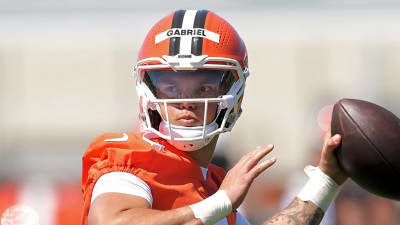
The Anaheim Ducks have officially wrapped up their 2024–25 campaign and head into the offseason with more questions than answers. After another year outside the playoff picture, the club is entering a pivotal moment in its rebuild. At the forefront of Anaheim’s summer to-do list is a much-needed overhaul of the special teams and a coaching search for a new direction behind the bench following the dismissal of head coach Greg Cronin.
The Ducks finished the season with one of the league’s worst combined special teams percentages. The power play, stagnant and predictable, ranked near the bottom in both conversion rate and puck movement efficiency. The penalty kill was not much better, often passive and lacking the aggressiveness needed to disrupt top units. In a league where special teams can make or break games, Anaheim’s shortcomings in these areas were glaring and costly.
Resetting the Bench
Greg Cronin’s firing came as little surprise. Despite his role in developing young talent and establishing structure, the on-ice product rarely reflected progress. The Ducks continued to struggle with identity and consistency. Their lack of adjustments especially in special teams was a sticking point all season. Cronin was praised for his player development at the AHL level. Though at the NHL level, the lack of cohesion and tactical clarity could not be ignored.
General Manager Pat Verbeek now faces a critical decision in selecting the next head coach in the Anaheim Ducks coaching search. The Ducks are no longer simply collecting draft picks. They need a coach who can elevate the current talent and turn potential into results. A few names stand out as strong candidates.
Potential Coaching Search Candidates
-
Dan Bylsma (Former Seattle Kraken Assistant and Coachella Valley Head Coach)
Bylsma, recently let go from Seattle, is a Stanley Cup winning coach with a strong developmental track record in the AHL. He has guided the Coachella Valley Firebirds to back-to-back deep playoff runs. He has earned respect for his player-first approach and communication. With experience building systems from the ground up, Bylsma could be the ideal bridge between the Ducks’ youth movement and their competitive aspirations. -
Jay Leach (Seattle Kraken Assistant Coach)
A former head coach in the AHL with the Providence Bruins, Leach is considered a defensive systems expert. Under his guidance, Seattle’s penalty kill has been among the most structured in the league. His calm demeanour and attention to detail might offer the kind of culture shift the Ducks need. -
Jeff Halpern (Tampa Bay Lightning Assistant Coach)
Halpern has been on Jon Cooper’s staff for several seasons and played a key role in Tampa Bay’s special teams units during their Cup runs. He brings championship experience and a reputation for being a players’ coach with tactical insight. If the Ducks want a winner to guide their young core, Halpern is a logical choice. -
Peter Laviolette (Former New York Rangers Head Coach)
Laviolette was recently dismissed by the Rangers, but his resume is among the most decorated in the coaching carousel. A veteran bench boss with over 750 career wins and a Stanley Cup on his résumé, Laviolette brings structure, urgency, and playoff pedigree. His teams demonstrate defensive accountability and a high compete level, two areas the Ducks must dramatically improve.
Whoever takes over the bench after the Anaheim Ducks coaching search will inherit a roster rich in young talent. This group is desperate for tactical refinement. Mason McTavish, Leo Carlsson, and Pavel Mintyukov are all key pieces, but their growth must be supported by systems that allow them to succeed. The same goes for Trevor Zegras, whose 2024–25 season was hampered by injuries and inconsistencies. A coach who can define roles and implement a clear structure could finally unlock Zegras’ next level.
Fixing The Special Teams
On the special teams front, the Ducks need to simplify the power play and inject it with more motion and deception. Too often this season, the unit was static, with predictable passing sequences that allowed defenders to set up easily. A dedicated power play coach with fresh ideas should be a hiring priority. On the penalty kill, the Ducks must move from a passive box to a more aggressive forecheck based system. With mobile defencemen like Olen Zellweger and Jackson LaCombe, there is potential to pressure puck carriers and force mistakes up ice.
Additionally, Anaheim should consider bringing in veteran assistant coaches with strong teaching skills. The development curve for young NHL players can be steep, and a staff that knows how to coach details. Especially in special teams situations will be crucial in getting the most out of this roster.
Looking Ahead
Goaltending was not the issue this season. Lukas Dostal showed promise, and John Gibson remains a reliable presence when healthy. Without consistent structure and support from the special teams, they often wasted their performances. Fixing the units in front of them will not only reduce high-danger chances but help swing close games back in the Ducks’ favour.
The 2025–26 season cannot be another year of stalled progress. This offseason is about setting a tone, both in the locker room and on the ice. With the Anaheim Ducks coaching search hiring the right coaching staff and addressing the systemic flaws in special teams are not just checkboxes on a to-do list. They are the foundation for Anaheim’s next chapter.
For the Ducks to take flight, it begins behind the bench.
More must-reads:
- Islanders sign top pick of 2025 draft
- Texas' Arch Manning has concern on OL after season-ending injury
- The 'NBA playoff point-per-game leaders' quiz
Breaking News
Trending News
Customize Your Newsletter
 +
+
Get the latest news and rumors, customized to your favorite sports and teams. Emailed daily. Always free!








